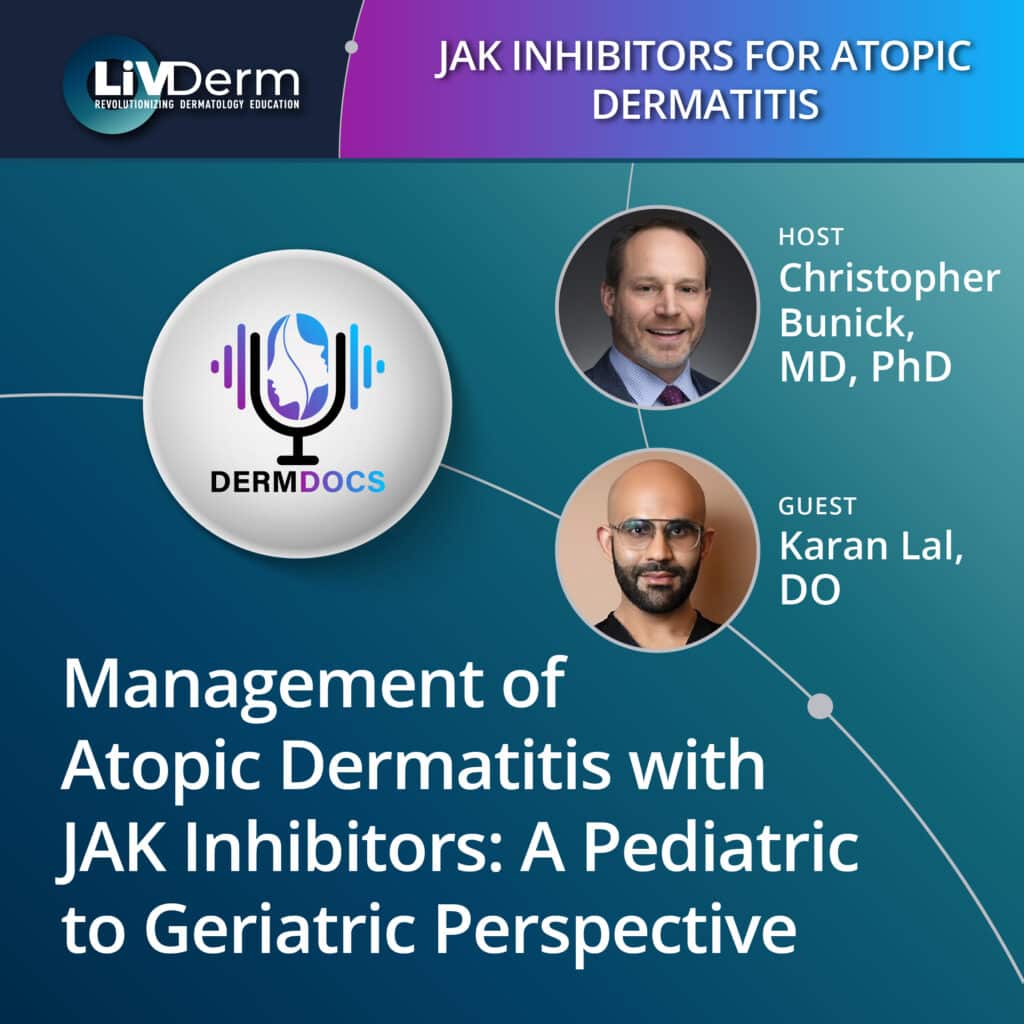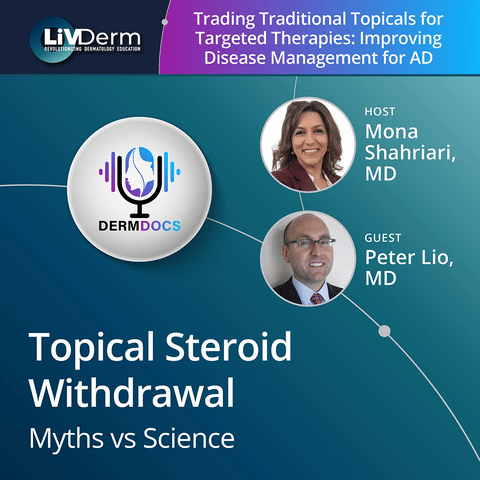Atopic Dermatitis
Digital Education Hubs
CME Virtual Symposium / Webcasts
Slides
2025
Getting Handy: CHE, Contact Derm, Palmar Hyperhidrosis, and Warts
Elizabeth Swanson, MD
Biologics in Pediatric Atopic Dermatits
Shivani Patel, MD
Updated on Systemic JAK Inhibitors for Atopic Dermatits
Robert Sidbury MD, MPH
Environmental Impact on Atopy
Peter Lio, MD
Latest Updates and Expert Recommendations in Treating Atopic Dermatitis
Emma Guttman-Yassky, MD, PhD and Shawn G. Kwatra, MD
JAK Inhibitors in Atopic Dermatitis
Christopher G. Bunick, MD, PhD
2024
Distinguishing Chronic Hand Eczema:
All Hands on Deck
Christopher Bunick, MD, PhD,
and Jonathan Silverberg, MD, PhD, MPH
Skirting Steroids in AD: New and Emerging Non-Steroidal Topical Agents
Christopher Bunick, MD, PhD
Skirting Steroids in AD: Dangers and Side Effects of Steroid Exposure in Treatment of AD
Peter Lio, MD
Updated Guidelines for Pediatric Atopic Dermatitis Robert Sidbury, MD, MPH
JAK Inhibitors for Pediatric Atopic Dermatitis
Robert Sidbury, MD, MPH
Biologics vs JAK Inhibitors for Atopic Dermatitis Christopher Bunick, MD, PhD, and Brett King, MD, PhD
New Topicals for AD and Psoriasis
Peter Lio, MD
2021
New Pediatric Drugs
Biologics in Dermatology
Clinical Update: Novel Agents for the Long‐Term Management of Moderate‐to‐Severe Atopic Dermatitis
Current Landscape in the Treatment of Atopic Dermatitis
Tapinarof: Therapeutic AhR Modulating Agent (TAMA)
2020
Skin of Color Symposium
Challenging Cases in Atopic Dermatitis
Therapeutics on the Horizon
Recent Advances in Moderate to Severe AD: JAK Inhibitors

JAK Inhibition and the Future of HS Treatment
The management of hidradenitis suppurativa (HS) is evolving, but many patients still face significant hurdles in achieving optimal outcomes with current therapies. In this episode, “JAK Inhibition and the Future of HS Treatment,” expert dermatologists, Hadar Lev-Tov, MD, and Jennifer L. Hsiao, MD discuss:
- Increasing Awareness: Debunking common myths and misconceptions about HS.
- Building Trust: Strategies for overcoming diagnostic delays and insufficient management.
- Comprehensive Care: Adopting a holistic approach, including addressing common comorbidities.
- The Road Ahead: Exploring the future of the HS treatment landscape, including JAK inhibition.
Podcast also available on:

Moving into the Non-Steroidal Topical Therapy Age
This is the final installment of our 4-part series, “Trading Traditional Topicals for Targeted Therapies: Improving Disease Management for AD.” In this episode, “Moving into the Non-Steroidal Topical Therapy Age,” we dive into the current and emerging landscape of targeted topical therapies for AD patients. Our experts review the latest clinical data, discuss how they are practically integrating these agents into their practice, and analyze the resulting impact on patient outcomes and their overall approach to AD management. Listen in as board-certified dermatologists, Mona Shahriari, MD and G. Michael Lewitt, MD discuss:
- Overview of targeted topical therapies, including next generation topicals
- Efficacy of targeted topicals compared to topical steroids
- Safety, limitations, and compatibility with other therapies
- How to integrate targeted topicals into clinical practice
- Pearls for treating pediatric and adult patients across the indicated age range
- This podcast is supported by an educational grant from Arcutis Biotherapeutics, Inc.
Podcast also available on:

Management of Atopic Dermatitis with JAK Inhibitors: A Pediatric to Geriatric Perspective
The recent expansion of the topical ruxolitinib approval to include pediatric patients aged 2 to 11 years with atopic dermatitis (AD) provides the first JAK inhibitor therapy option for this young population. In this episode, “Management of Atopic Dermatitis with JAK Inhibitors: A Pediatric to Geriatric Perspective,” expert dermatologists, Christopher Bunick, MD, PhD and Karan Lal, DO discuss:
- Importance of JAK/STAT signaling in AD and the role of JAK inhibition in the future of dermatology
- Long-term safety of topical therapies for chronic AD
- Topline efficacy safety data from the phase 3 TRuE-AD3 clinical trial
- Shifting the paradigm of topical AD care across patient populations
Podcast also available on:

Addressing Patient Concerns Regarding Treatment of Dermatoses Using Steroids – How to De-Escalate and Inform Patients and Caregivers
This is the third part of our four-part series, “Trading Traditional Topicals for Targeted Therapies: Improving Disease Management for AD.” This episode, “Addressing Patient Concerns Regarding Treatment of Dermatoses Using Steroids,” focuses on the importance of patient education and shared decision-making.
In this episode, supported by an educational grant from Arcutis, expert dermatologists Mona Shahriari, MD and Alexandra Golant, MD discuss how to effectively inform and de-escalate concerns from patients and caregivers regarding steroid treatments for atopic dermatitis.
Join us as we explore:
- The risks and benefits of using topical steroids and non-steroidals.
- How to involve patients in their treatment decisions.
- Managing side effects from topical steroids, especially for patients with skin of color.
- Tips for helping patients with daily AD care.
- Pearls for patient education.
Podcast also available on:

Topical Steroid Withdrawal – Myths vs Science
In the second installment of our four-part series, “Trading Traditional Topicals for Targeted Therapies: Improving Disease Management for AD,” we’re tackling a topic that’s often misunderstood and highly challenging: Topical Steroid Withdrawal (TSW). Supported by an educational grant from Arcutis, this episode, “Topical Steroid Withdrawal – Myths vs Science,” features expert dermatologists Dr Mona Shahriari, MD, and Dr Peter Lio, MD.
Join us as we separate fact from fiction and dive deep into:
- The common pitfalls of overusing or misusing topical corticosteroids (TCS)
- How to recognize the telltale signs and symptoms of TSW
- Effective and compassionate strategies for managing TSW
- The key to using TCS responsibly
- Understanding when to pivot to targeted, non-steroidal treatments.
For those interested in the science behind TSW, we’ve included a link to a recent publication on the disease mechanism: Topical Steroid Withdrawal Is a Targetable Excess of Mitochondrial NAD – PubMed
Podcast also available on:

Steroidal vs Non-Steroidal Treatment – Case by Case Discussion
This is the first episode of a four-part series, “Trading Traditional Topicals for Targeted Therapies: Improving Disease Management for AD”, supported by an educational grant from Arcutis. In this episode, “Steroidal vs Non-Steroidal Topicals – Case by Case Discussion,” expert dermatologists, Dr Mona Shahriari, MD and Dr James Song, MD, discuss:
Appropriate use of topical corticosteroids and targeted topicals for atopic dermatitis
Benefits of topical corticosteroids and remaining unmet needs
How new targeted topicals fit into the atopic dermatitis toolbox and improve adherence to therapy
Case-based discussion of targeted topicals for the treatment of AD.
Podcast also available on:

Linda Stein Gold,
MD
Clinical Update: Novel Agents for the Long-Term Management of Moderate-to-Severe Atopic Dermatitis
Linda Stein Gold, MD, Chair of the CME Symposium “Clinical Update: Novel Agents for the Long-Term Management of Moderate-to-Severe Atopic Dermatitis” at SBS 2021, leads a panel discussion with Peter Lio, MD and Andrew Alexis, MD, to share clinical pearls and key takeaways about the management of atopic dermatitis.
Podcast also available on:

Fernanda Schmidt,
MD
Evolving Paradigms in Atopic Dermatitis
Fernanda Schmidt, MD shares some clinical pearls about the evolving paradigms in AD, including:
- What are the inside-out and outside-in mechanisms of AD?
- Is there a difference between these mechanisms across the age spectrum – from children to adults?
- Can we halt the atopic march by repairing the skin, or is it more than “skin deep”?
Podcast also available on:

Leon Kircik,
MD
Perspectives on Emerging AD Therapies
Leon Kircik, MD discusses the potential role of emerging AD treatments, including:
- Why has atopic dermatitis lagged behind compared to psoriasis in terms of approved targeted treatments?
- What are some of the most promising therapies that will likely be part of the AD treatment table in the near future?
- Do you foresee that they will be also approved for pediatric AD, or only for the adult population?
- In terms of assessing disease severity, how practical are the scales used in clinical trials? Should we put more emphasis on patient-reported outcomes?
Podcast also available on:

Lawrence Schachner,
MD
Pearls on Integrating Newer AD Treatments
Lawrence Schachner, MD discusses clinical pearls on the diagnosis and treatment of pediatric AD, including:
- How do we make sure that we correctly diagnose atopic dermatitis? What are some clinical pearls you can share for our audience?
- Since now dupilumab is approved for children with atopic dermatitis, what is its role and where would it fit into the “Schachner ladder”?
- How do crisaborole and dupilumab fit into the long-term care of AD? For how long should they be used?
Podcast also available on:

Neal Bhatia,
MD
The Promise of JAK Inhibitors in AD
Neal Bhatia, MD discusses the potential role of JAKis in AD, including:
- What changes would JAKis bring to the treatment of AD in the near future?
- What are some JAKis currently under clinical development for AD?
- Do you foresee that JAKis will play a role in both adult and pediatric AD?
- Where do you think they will fit in with the other recently-approved treatments for AD, or overall in the treatment regimen?
- What are the long-term implications for dermatology practice?
Podcast also available on:
Patient Resources
Atopic dermatitis (AD), sometimes called eczema, is one of many allergic skin conditions that affects children and adults. AD is a chronic and often relapsing disease which presents as a dry, scaly rash that be accompanied by redness, itching, oozing, cracking or bleeding. People with AD are more likely to develop another atopic condition and are more prone to infections and mental health conditions. The management of AD involves keeping the skin clean and moisturized, eliminating irritants, using topical and oral medications, and avoiding flares and infections.













